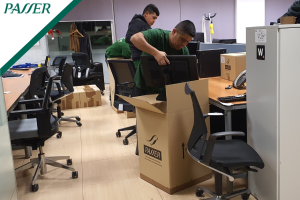Teleworking: the home office
Telecommuting It's one of the most relevant words in today's work environment. More and more companies are offering their employees the option to work from home a few days a month, as a way to improve work-life balance. Thanks to technological advances, this option is more viable than ever, and in many cases, more profitable as well.
How teleworking has evolved
Digital tools such as email, internet access, and mobile phones have allowed employees to work all or part of their workdays from home, without having to physically go to the office. This not only reduces commutes but also optimizes time and resources and improves workers' quality of life.
Digital tools that make it possible
Many companies are incorporating specialized software that allows teams to stay connected, share information, organize video calls and meetings, and manage workflows remotely. These programs not only facilitate internal communication but also allow for monitoring employees' daily activity to ensure their tasks are being performed, thus offering greater control and confidence in this work model.
Advantages of teleworking for the company
Remote work is not only perceived as a modern solution, but also as a competitive advantage for companies that implement it correctly. It provides access to talent profiles that would otherwise be unavailable due to geographical or scheduling constraints, and at the same time, it saves on costs such as food, transportation, electricity, water, and even physical office space.
What companies should take into account
As a personnel manager or business owner, it's a good idea to consider whether your company is ready to implement this approach. One of the key considerations is whether you'll provide employees with the necessary furniture to set up their home office: desks, ergonomic chairs, computers, filing cabinets, office supplies, and a high-quality internet connection. In many cases, employees work better when they have a suitable environment, so ensuring these conditions is essential to maintaining productivity.
Differences with freelance work
Although it's sometimes confused with freelance work, teleworking is a perfectly valid option within a formal employment relationship, as long as it's properly managed. Each company can define its own policy: some allow working from home all week, others limit it to certain days, or others apply it only during specific times of the year, such as school holidays. This flexibility is precisely one of the great advantages of teleworking.
There is no single teleworking model
There is no single definition or standard model for remote work. Ideally, it should be tailored to the specific needs of each company and each employee. Some organizations have even opted to replicate the same conditions as in their physical workplace in the employee's home, so that the only difference is the location from which they work.
How Passer Moving can help you
At Passer Moving, we know that adapting your company to remote work can seem complicated, but we can help you do it in an easy and organized way. We offer specific services to move furniture and equipment from the office to your employees' homes, set up their new home office according to their needs, move physical files, and much more. We can also help you reorganize your office space if you reduce the number of in-person visits by some teams.
More resources to adapt your office
If you are considering implementing teleworking in your company, or even reorganizing your office based on this new reality, you can consult other content on our blog such as how to choose an office either the advantages of open offices, where you'll find inspiration and practical advice.
Conclusion
Remote work isn't just a trend; it's a real opportunity to modernize your business and offer better working conditions. At Passer Moving, we're ready to help you with this transition.








